Both Qualcomm and Apple scored wins Tuesday in separate decisions from the U.S. International Trade Commission in the pair’s lengthy patent dispute, which is slated to go to trial next month in federal court.
Apple took a more definitive win, with the full commission issuing a final determination that Qualcomm’s patent claims were invalid so there was no infringement by Apple. This overturned a September ruling from another judge that sided with Qualcomm. Qualcomm says it will ask the commission to reconsider Tuesday’s decision. Earlier this month a jury sided with Qualcomm, finding Apple did infringe on the chip maker’s patents and owes $31 million in damages.
“The Commission’s decision is inconsistent with the recent unanimous jury verdict finding infringement of the same patent after Apple abandoned its invalidity defense at the end of trial. We will seek reconsideration by the Commission in view of the jury verdict,” Qualcomm said in a statement.
Earlier on Tuesday, Administrative Law Judge MaryJoan McNamara issued an initial ruling that found a Qualcomm patent related to power management for improved mobile device battery life is valid and infringed on by Apple. She recommended the commission ban importation or sale of the infringing devices.
The full commission still needs to consider Judge McNamara’s initial determination and recommendation, and a final decision is expected by July 26. Qualcomm said the technology in question is used widely in Apple devices, including iPhones since the iPhone 7 model.
“We are pleased that today ITC Judge McNamara found that Apple-designed processors infringe our ‘674 patent and will be recommending an import ban and cease and desist order to the Commission,” said Don Rosenberg, executive vice president and general counsel for Qualcomm, in a statement. “The innovations we contribute to the iPhone extend well beyond a single component and Judge McNamara’s decision, along with recent infringement rulings in other U.S. and foreign courts, affirm the value of our technologies.”
An Apple spokesperson told the Wall Street Journal that the commission’s decision against Qualcomm helped preserve fair competition.
“We look forward to detailing the many ways they’re harming consumers and stifling innovation when we present our case in San Diego next month,” he added.

